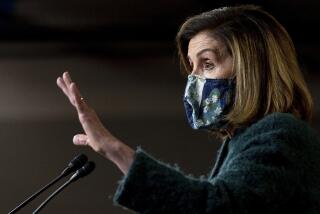Tokyo’s Big Fuzzy Economy Plan
- Share via
The rest of the world has watched with nail-biting worry in recent months as Japan’s economy slid toward a precipice. Unemployment has risen, the yen has dropped and the stock market is down. With the rest of Asia in so much economic trouble, governments feared that if Japan tumbled into a full-blown recession, the rest of the region might suffer a disaster strongly felt on this side of the Pacific.
Thus Thursday’s announcement that the Japanese government will put together a $124-billion economic stimulus package, about half again larger than what was expected, is very good news. The announcement was vague about how the money will be apportioned between trickle-down public works spending and tax cuts, which would more immediately boost the economy and trim Japan’s trade surplus. The plan nonetheless is welcome.
Whether any amount of tax cut will work depends on public confidence in the government of Prime Minister Ryutaro Hashimoto. If the Japanese people fear for the future of their own economy, they’ll be more likely to put the proceeds of their tax cuts under the mattress. The unexpected size of the stimulus package should itself be a source of confidence, indicating that the government is serious about fixing the problems. Tokyo should also keep working to shore up confidence in the scandal-rattled banking system.
There are still a lot of ifs and maybes to get past. The stimulus plan so far amounts to one big number and hints that substantial part of it might go to tax cuts. World markets reacted cautiously. If the specifics in the end look good to Japanese consumers and they take out their wallets, the resulting economic boost will send a sigh of relief not only through Asia but the rest of the world.
More to Read
Inside the business of entertainment
The Wide Shot brings you news, analysis and insights on everything from streaming wars to production — and what it all means for the future.
You may occasionally receive promotional content from the Los Angeles Times.










